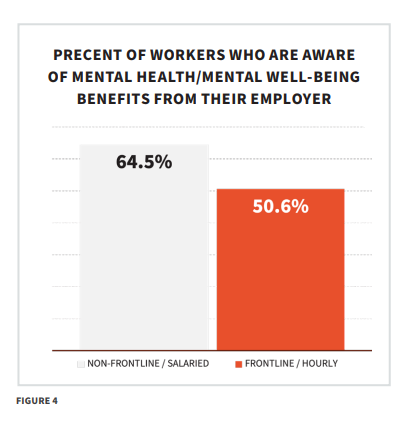Frontline workers are 33% more anxious than desk-based counterparts
This a huge problem, but it is largely going under the radar – here’s some solutions based on Blink and meQ data!
News In Brief
Frontline is facing a 'silent burnout' crisis, and this is impacting engagement, wellbeing as well as retention.
Here's why stress remains sky-high in the frontline, according to new data from Blink and meQ.
And here's how to fix it, featuring exclusive comments from Blink's founder and CEO Sean Nolan.
Frontline workers are the backbone of many industries; the pandemic really proved this point.
While COVID-19 was uniquely stressful for the frontline workers, they continue to face extreme stress and serious mental health problems.
A recent US report from meQ found that the rates of anxiety and depression are 33% and 61% higher respectively for frontline workers, than desk-based workers.

Credit: meQ.
meQ’s survey of 1,200 frontline workers (plus a non-frontline control group) found that these workers are really facing financial stress.
They are 19% more likely to worry about the cost of living (than their non-frontline counterparts), and 33% more likely to be concerned about keeping up with their monthly bills.
Adding to their stress is the fact they are facing increasing abuse at work from customers. Recent data from the British Retail Consortium (BRC) found there’s been a 50% increase in levels of violence and other abuse towards retail workers in the past year.
The BRC’s chief executive Helen Dickinson shared: “With over 1,300 incidents every day, government can no longer ignore the plight of ordinary, hardworking retail colleagues.
And while the violence can be over in a moment, the victims carry these experiences with them for a lifetime. And we all know the impact does not stop there – it affects their colleagues, friends, and the family our colleagues go home to.
“This is a crisis that demands action now.”
Fixing ‘silent burnout’ in the frontline
It is clear that HR leaders, as well as managers, need to step and do something – not just to avert a mental health crisis, but also to avoid continuing sky-high attrition rates impacting frontline employees globally.
But the issue, especially when it comes to burnout, is that frontline workers are 30% less likely to seek professional help to deal with mental health worries, and are half as likely to go to their manager or organizational leader to ask for help.
This is creating a so-called ‘silent burnout’ crisis – that’s according to Blink, an employee experience app focusing on the frontline.
Blink’s data shows that globally there was a 43% drop in enthusiasm and engagement rates among the frontline in 2023. The figures are 41% in the UK and 21% in the US. This data is based on usage of Blink’s app by 227,000 frontline employees from 662 global companies.
The sectors that are most affected are logistics, which saw a 58% drop in 2023 – retail saw a 25% decline, whereas both healthcare and transport saw a 36% reduction.
What’s particularly concerning is that there has been a drop in frontline engagement for the past three years, but 2023 saw the biggest drop. Understandably, the extreme financial stress (the cost of living crisis is still not letting up), combined with increased workplace abuse, is all getting too much!
Talking exclusively to UNLEASH, Blink founder and CEO Sean Nolan shares that this data is interesting, but it is not surprising based on what the tech company is hearing from its customers.
“Some industries are hit harder than others, [but] it’s a trend that remains consistent across most industries that rely on frontline teams, indicating a clear need for HR teams to face these challenges head on.”
So, what’s the solution?
The first thing, according to Blink, is for HR to closely monitor workloads and shift patterns.
Nolan adds: “Being aware of the times when ‘silent burnout’ is rife means HR teams can be ready to proactively prioritize employee wellbeing.
“It is important to provide a supportive work environment where communication is encouraged and accessible for all employees.”
Along a similar vein, for meQ, it is all about enabling employees to take time off to recharge; currently this is a challenge because employees worry about not earning any money.
Employers need to great creative here – and think about financial wellbeing options – as, at the end of the day, having burnout, disengaged frontline workers is not a recipe for success.
There’s a big piece of work for HR to do on educating managers and employees about the benefits and support on offer – meQ’s report found that awareness of employer-provided benefits was 22% lower among frontline staff compared to non-frontline staff.

Credit: meQ.
meQ’s report added that HR needs to lean into “tailored outreach delivered through frontline communication channels, relatable messaging, and authentic visual content”, all of which are proven to be effective and lead to impressive wellbeing and engagement benefits.
HR, are you ready to take action to reduce stress, keep morale up, and ultimately drive more productive workforces that are good for business?
Sign up to the UNLEASH Newsletter
Get the Editor’s picks of the week delivered straight to your inbox!

Chief Reporter, UNLEASH
Allie is an award-winning business journalist and can be reached at alexandra@unleash.ai.
Contact Us
"*" indicates required fields
Partner with UNLEASH
"*" indicates required fields